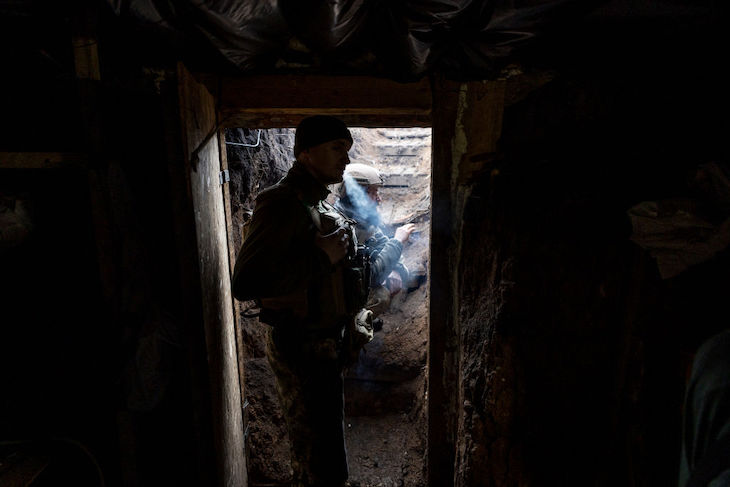What salary should a soldier receive in a war-torn country? Obviously, there is no number that can make up for the sacrifice Ukrainians make on the frontline. But a proper salary is still necessary. When Russia invaded last year, Volodymyr Zelensky increased the payment for the military to seven times of the average salary in Ukraine. ‘We will pay 100,000 hryvnias (£2,200) monthly to military personnel who hold weapons… so that they know that the country is grateful to them. And so it will be until this war ends,’ Zelensky said. The war, as it has turned out, is well into its second year – and the Ukrainian President is faced with the costs.
In peacetime, Zelensky would have been called a populist by offering cash that he doesn’t really have. Before the full-scale invasion, the average Ukrainian soldier was paid about the national average: 14,000 hryvnias (£300) a month. A sevenfold jump was not affordable on a sustainable basis. But with Russian tanks moving on to Kyiv, the decision to boost military pay was a vital move to ensure the country’s survival. So the government introduced two kinds of additional payments: 100,000 hryvnias (£2,200) for those on the frontline, directly fighting the enemy, and 30,000 hryvnias (£650) for the rest of the servicemen, dispersed all over Ukraine. Soldiers felt their courage to fight for the state would be fairly rewarded. The ranks of the military were quickly filled with thousands of volunteers. The conscription had also gained momentum.
Not only are the new rules stingy, but they’re fiddly
As a result, financing Ukraine’s military and security agencies absorbs half of the country’s entire budget. The situation was complicated by the fact that Ukraine cannot use international aid for defence. These are the conditions under which partners provide funds to cover the budget deficit – which this year will hit £33 billion. This means that Ukraine can only finance its army with the help of taxes or internal borrowing. So Kyiv found that it had to go back on its original promise, tighten the purse strings – and cut the payments to military personnel.
In February this year, the government changed the requirements for receiving an additional monthly reward for the military. Now 30,000 hryvnias (£650) can be paid only to servicemen who perform ‘combat tasks’. The 100,000 hryvnias (£2,200) reward was also split up for some fighters: it now depends on where the soldier is serving and the complexity of the combat tasks. This caused outrage among the military and the population. How can the government possibly measure the level of danger each soldier faces? Infantry soldiers often die first, fighting on enemy lines. Artillery units perform their duty several miles away, but are still at risk. How can that danger, that sacrifice, be quantified – then translated into pay?
Roman Nabozhniak, a soldier, wrote a heartbreaking article for Ukrainian Pravda after the new pay rules were implemented. ‘Someone at headquarters has decided that you’re not in a combat action zone any more. So you can go screw yourself without combat pay. Now, everything’s the same, but you’re doing it for 20,000 hryvnias (£433) a month instead of 114,000 (£2,470). In short, your life and health are now worth 5.7 times less than last month,’ he wrote.
Not only are the new rules stingy, but they’re fiddly. Often, soldiers will try to work out their monthly salaries based on the bands they think they meet – but end up with a nasty surprise at the end of the month. They see it unfair as they often have to pay for equipment, drones and even vehicles from their pay packets (which comes as a surprise to many in the West, but despite all donations the soldiers still don’t have enough tools to fight the Russian army). The Ukrainian parliament tried to calm things down this month by voting to restore the additional allowance of 30,000 hryvnias (£650) to Ukrainian soldiers outside the combat zone. But the final decision has yet to be made. On the one hand, this amendment cuts the payments to all civil servants – with the aim that the money will be used for soldiers. But on the other hand, it creates an imbalance in the state budget. A source from parliament told Ukrainian Pravda: ‘It was pure populism… The decision was passed because everyone read only the first part of the amendment about 30,000,’ but, as it turned out, not the part which talks about where to find the extra money.
Zelensky found out about the voting after the fact. The amendment to return the 30,000 hryvnias payment to soldiers was offered by his opponent (and former chairman of Zelensky’s party) Dmytro Razumkov, and was voted on so quickly that it surprised the President. Zelensky won’t veto the amendment, as he’d only provoke societal anger towards himself. So now the problem must be solved by his party’s parliamentary members.
Ultimately, the reductions in military allowance may not affect expenditures at all. And, because conscription is running in the background, the expenses on soldiers’ salaries will subsume any potential savings. Let’s not forget that the Ukrainian army is suffering losses and the state continues to pay 100,000 hryvnias (£2,200) to the wounded, as well as for the families of prisoners of war and missing persons, and 15 million hryvnias (£326,000) to the bereaved families of the fallen. All this means only one thing: defence spending will keep increasing while Ukraine looks for a way to pay its defenders properly.
Update:
On 28th June, the Verkhovna Rada, the Ukrainian parliament, passed the draft law in its entirety, stipulating that military personnel would receive additional payments ranging from 30,000 to 100,000 hryvnias (£650-£2,200) based on the duration of their engagement in special combat tasks. This means the rewards for Ukrainian soldiers outside the combat zone will not be reinstated. The populist law voted by the Parliament in April, which aimed to return 30,000 hryvnias (£650) payment for the military outside the combat zone, failed to address the funding source for the hefty expenses exceeding £4 billion and risked exacerbating Ukraine’s budget deficit.
Sign up to The Spectator’s weekly Ukraine in Focus newsletter here







Comments